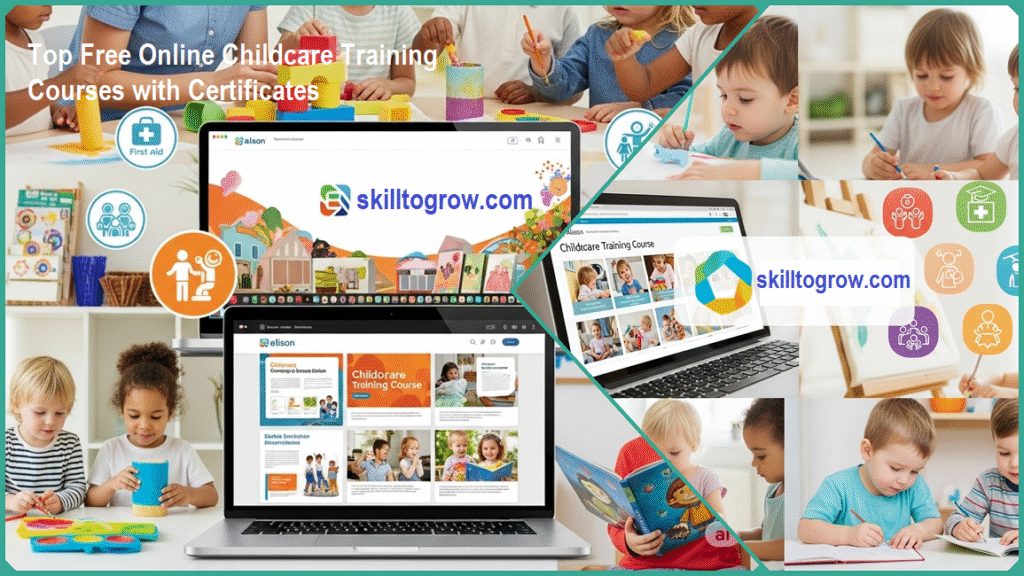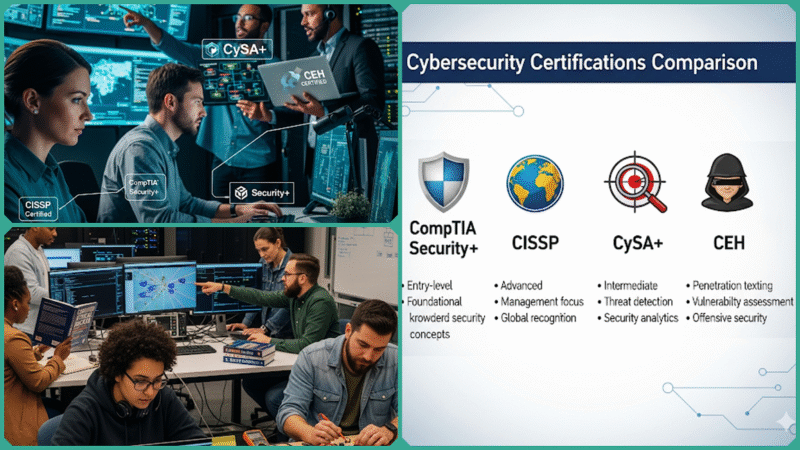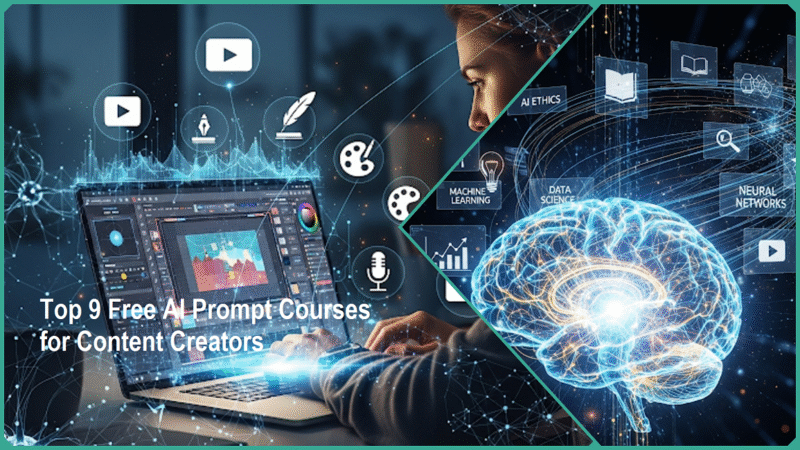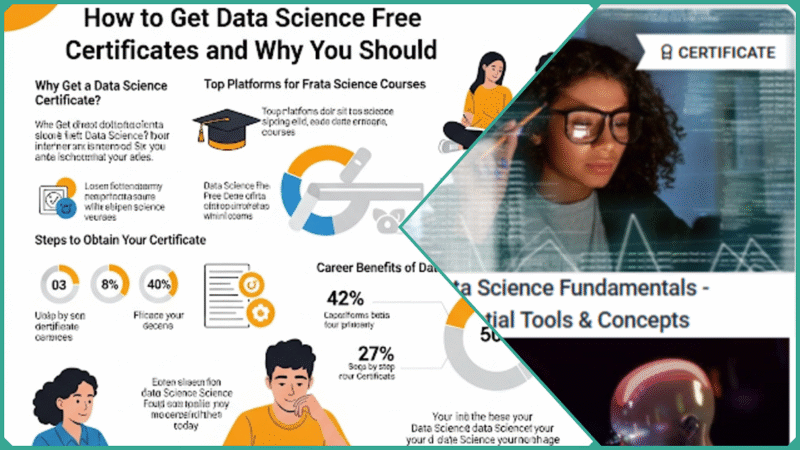Top Free Online Childcare Training Courses with Certificates
Estimated reading time: 17 minutes
High-quality childcare education is critical and essential—not only for individuals who are aspiring to enter this rewarding and impactful field but also for current childcare professionals, as well as parents and caregivers who are eager to enhance their knowledge, skills, and understanding in today’s ever-evolving world. This education plays a crucial role in ensuring the best outcomes for children’s development and well-being.
Fortunately, access to quality childcare training has become more accessible thanks to free online platforms like Alison, which provide comprehensive courses complete with certificates. These online childcare training courses equip learners with essential practical skills, promote child safety, and enhance career prospects—all without any financial burden.

This blog post provides an in-depth exploration of the top free online childcare training courses with certificates featured on Alison. It thoroughly examines their numerous benefits, detailed course structure, practical relevance, and how these courses empower a wide and diverse audience.
This audience includes not only aspiring childcare workers seeking professional development but also stay-at-home parents looking to enhance their skills and career changers aiming to enter the childcare field with confidence and knowledge.
Why Online Childcare Training Courses Matter
Childcare is not just about supervision—it’s about nurturing children’s growth physically, emotionally, and intellectually during their most formative years. Research extensively supports that early childhood development deeply influences future learning, behavior, and well-being, making quality childcare pivotal.
For professionals and caregivers alike, training helps to understand child development stages, health and safety, child protection, and effective communication techniques. Childcare workers often need ongoing education for licensing, improved job readiness, or career advancement.
For parents and caregivers, gaining childcare expertise helps create safe, stimulating environments at home, promoting positive parenting. Offering free, accessible, and certified training removes financial and geographic barriers, democratizing professional development and raising care standards globally.
Essential Concepts in Childcare Training
Before diving into the various courses available, it is incredibly useful to first gain a solid understanding of the key foundational concepts that are included in children’s care training programs. These fundamental ideas form the essential basis upon which all further learning and practical application are built, ensuring a comprehensive grasp of the subject matter.
- Child Development: Gaining a comprehensive understanding of the various physical, cognitive, social, and emotional phases of child development is essential for effectively tailoring care and educational approaches. This deeper insight allows caregivers and educators to meet the unique needs of each child more accurately and support their growth and learning in a meaningful way.
- Health and Safety: Gaining knowledge and skills in first aid, proper hygiene practices, and effective risk prevention strategies plays a crucial role in safeguarding children’s overall wellbeing. These important lessons help create a safe and secure environment where children can thrive and develop healthily.
- Child Protection: Having a thorough understanding of how to recognize various forms of abuse and neglect, as well as knowing how to implement effective safeguarding measures, is absolutely essential for anyone involved in legal and ethical caretaking. This knowledge ensures the safety and well-being of vulnerable individuals and helps prevent harm in all care environments.
- Early Years Foundation Stage (EYFS): This is a widely recognized and essential framework used throughout the United Kingdom to guide the education and care of children under the age of five. It places strong emphasis on promoting positive learning outcomes and supporting the overall well-being of young children during these crucial early years of development.
- Positive Guidance: Techniques that promote effective behavior management by focusing on encouragement, mutual respect, and consistent responses rather than relying on punishment or negative consequences. These methods aim to foster a supportive environment where individuals feel valued and motivated to exhibit positive behavior through understanding and reinforcement.
- Inclusive Care: Making thoughtful adaptations to support children with special needs or those who have experienced trauma helps create nurturing, supportive, and empowering environments that benefit every child involved. These tailored approaches ensure that all children feel valued, understood, and cared for, promoting their overall well-being and development in a compassionate setting.
These comprehensive frameworks are designed to significantly enhance both the confidence and competence of childcare workers by providing them with structured guidance and best practices. At the same time, they empower parents to make well-informed decisions regarding their children’s care and development, ensuring a more supportive and nurturing environment for all involved.
Top Free Online Childcare Training Courses on Alison
The free online childcare training courses provided by Alison represent an excellent and valuable resource for learners across the globe who are looking for accessible, flexible, and highly reputable childcare education options. These courses not only offer comprehensive learning opportunities but also come with certificates that significantly boost employability and enhance professional credibility in the childcare industry.
Here is a summary of Alison’s standout childcare courses you mentioned, with additional context and SEO-optimized details to help highlight their value:
| Course Title | Key Topics Covered | Duration | Ideal For | Certificate Type |
|---|---|---|---|---|
| Childcare and Early Years Foundation Stage (EYFS) | Introduction to the EYFS framework, child teaching strategies, child safety | 3-4 hours | Aspiring childcare professionals and educators | CPD Accredited Certificate |
| Child Protection and Welfare | Types and signs of abuse, legal responsibilities, and creating safe environments | 3-4 hours | Caregivers, daycare workers, volunteers | Certificate of Completion |
| Childcare and Young People Development | Child development stages, nurturing practices, supervisory skills | 3-4 hours | Those working with children and adolescents | CPD Accredited Certificate |
| Child Care – Health and Safety | Pediatric first aid basics, hygiene, and developmental support | 4-5 hours | New parents, babysitters, childcare workers | Certificate on Completion |
Why These Courses Are Powerful
- Self-Paced and Accessible Worldwide: Learners can study anytime, fitting education around other commitments, which is crucial for busy caregivers or professionals.
- CPD Accreditation: Courses like EYFS and Childcare, and Young People Development offer CPD (Continuing Professional Development) accredited certificates, which are respected credentials boosting your resume and career opportunities.
- Comprehensive Content: Topics range from essential frameworks like EYFS to critical child protection knowledge and first aid, providing a well-rounded foundation for various childcare roles.
- Free to Study with Optional Paid Certificates: You can take the courses entirely for free; certificates are optional but add professional value.
Course Highlights
- The Childcare and Early Years Foundation Stage (EYFS) course is aligned with the UK’s early years regulatory framework, ideal for those targeting roles in nurseries or early education centers.
- Child Protection and Welfare is highly practical, teaching recognition of abuse signs and legal safeguarding obligations—a must-have skill in any childcare setting.
- The Child Care – Health and Safety course covers pediatric first aid and hygiene, critical for protecting children’s health.
Recommendations for Learners
- Combine Multiple Courses: Taking two or more courses can provide a more comprehensive skill set relevant to childcare jobs or personal caregiving roles.
- Leverage Certificates for Career Growth: Include Alison certificates on your LinkedIn profile and CV to demonstrate validated childcare expertise.
- Stay Updated on Trends: Supplement these foundational courses with additional learning on trauma-informed care, inclusion, and mental health in childcare.
Benefits of Taking Free Online Childcare Training Courses
The benefits you have listed regarding taking free online childcare training courses, particularly those offered on platforms like Alison, are strongly supported and validated by the most current and reliable information available about these programs today:
Cost-Free Professional Development
Alison courses eliminate a significant obstacle to education—tuition fees—thereby enabling learners from all around the world to access top-quality childcare training without having to worry about any costs.
By removing this financial barrier, Alison democratizes access to education and opens up valuable learning opportunities for individuals who may have limited financial resources. This approach allows more people to acquire essential skills that can improve their career prospects and personal development.
Certification to Boost Employment
Alison provides CPD (Continuing Professional Development) accredited certificates for a wide range of childcare courses, including popular titles such as “Childcare and EYFS” and “Childcare and Young People Development.” These certificates serve as official validation of your skills and knowledge in the childcare field, showcasing your dedication and professionalism to current and potential employers.
Earning these certificates not only enhances your resume but also significantly boosts your career prospects by demonstrating your commitment to ongoing learning and professional growth within the childcare industry.
Flexibility and Accessibility
Courses are designed to be entirely self-paced and accessible online around the clock, 24 hours a day, 7 days a week. This flexible availability allows learners to study at their convenience, making it easier to balance their educational goals with other important life commitments.
This format is especially supportive for busy caregivers, parents managing family responsibilities, and working professionals juggling demanding schedules, providing them with the freedom to learn whenever it best fits into their daily routines.
Diverse Topics for Varied Needs
Alison’s childcare courses offer comprehensive coverage of foundational knowledge, including essential topics such as child development and the Early Years Foundation Stage (EYFS) framework. In addition to these basics, the courses also focus on crucial safety aspects like first aid, health, and hygiene practices to ensure a safe environment for children.
Furthermore, the curriculum addresses important child protection measures, equipping learners with the skills to safeguard children effectively. Specialized topics are also available, such as caring for children with special needs, which provides targeted knowledge for those interested in this area.
This wide variety of courses allows learners to customize and tailor their education according to their current career stage or specific personal interests, making the learning experience highly relevant and adaptable.
Enhanced Childcare Quality and Safety
Training through these comprehensive courses equips caregivers with the essential knowledge and skills needed to provide safer, more supportive environments for children. These courses cover a wide range of critical areas, including the recognition of different types of abuse, implementation of health and safety best practices, and strategies for developmental support.
By gaining expertise in these important topics, caregivers are better prepared to create nurturing spaces that significantly enhance children’s wellbeing and contribute to improved overall outcomes in their growth and development.
In summary
Alison’s free online childcare courses offer an accessible, flexible, and highly credible pathway for professional development that significantly boosts employability while simultaneously enhancing the overall quality and safety of childcare services.
These courses are designed to empower a wide and diverse audience—from those who are just starting their careers and aspiring to work in childcare, to experienced caregivers looking to refine and expand their existing skills.
By providing affordable and convenient learning opportunities, Alison enables individuals to upgrade their knowledge and competencies without the typical barriers of cost or location, making professional growth in the childcare sector more attainable than ever before.
Current Trends in Childcare Training and Development
The current trends in childcare training and development for 2025 strongly align with the themes you mentioned—especially trauma-informed care, inclusion and diversity, technology integration, mental health focus, and parental engagement—and these are being actively reflected across the childcare sector and training programs like those on Alison.
Based on recent authoritative industry insights, here is a targeted overview and elaboration of these key trends in 2025 childcare training and development:
Trauma-Informed Care
Childcare providers today are receiving more extensive and specialized training to recognize and effectively respond to trauma in children. They are gaining a deeper understanding of the wide-ranging effects that adverse childhood experiences (ACEs) can have on a child’s behavior and overall development.
This trauma-informed approach not only promotes emotional safety but also ensures that support is carefully tailored to meet each child’s unique needs. Such a skill set is rapidly becoming essential in the field of early childhood education, especially as the demand continues to grow for caregiving that is emotionally responsive and sensitive to the challenges many children face.
Inclusion and Diversity
Training programs now place a much stronger emphasis on culturally competent practices and inclusive care strategies, particularly when working with children who have disabilities or come from a wide range of diverse cultural backgrounds.
There is a significant focus on developing specialized skills that support children with special needs while actively promoting equity and fairness within various learning environments. This shift is closely connected to the increasing demands from parents and regulatory bodies who expect childcare providers to deliver education that is not only accessible and respectful but also tailored to meet the unique needs of each child.
Technology Integration
Digital tools are rapidly becoming central to early childhood education—not only for streamlining administrative tasks but also for significantly enhancing educational engagement through innovative interactive learning experiences and effective communication with families.
Training modules now comprehensively incorporate digital literacy for caregivers, providing thorough instruction on how to navigate and utilize various apps and platforms designed to track child development milestones and share real-time updates with parents clearly and transparently. This integration of technology helps create a more connected and informed learning environment for children, caregivers, and families alike.
Mental Health Focus
Childcare professionals now receive significantly enhanced and comprehensive training focused specifically on supporting children’s mental and emotional wellbeing in various settings. This expanded training includes learning to accurately recognize early signs and symptoms of anxiety, stress, or potential developmental challenges that children may experience.
Additionally, professionals are taught to implement positive guidance techniques intentionally designed to nurture and promote healthy social-emotional development in young children. This important focus on mental and emotional health aligns closely with broader mental health awareness campaigns happening nationally and globally, as well as the increasing recognition of the critical need for trauma-informed practices within childcare environments.
Parental Engagement
Collaborative approaches that actively involve parents as essential partners in their child’s overall development are strongly emphasized throughout the process. The training programs place significant focus on enhancing communication skills, implementing effective family involvement strategies, and promoting culturally sensitive engagement practices.
These combined efforts effectively improve developmental outcomes by ensuring that care is consistently aligned and well-coordinated between healthcare providers and families, fostering a supportive and inclusive environment for the child’s growth.
Professional Development and Credentialing
The childcare workforce is currently experiencing a significant push toward adopting standardized credentials, such as the widely recognized Child Development Associate (CDA) certification. This movement aims to ensure a consistently high and reliable level of competency and professionalism across the entire field.
Additionally, ongoing professional development and continuous learning opportunities are strongly encouraged and supported to help childcare providers keep pace with the rapidly evolving best practices, new research findings, and ever-changing regulatory standards that govern the industry.
Flexible and Hybrid Learning Models
Reflecting the evolving needs of today’s workforce, many modern training programs now offer hybrid or fully online learning models, which provide a high degree of flexibility for caregivers to study and complete coursework at their own convenient pace.
These adaptable learning formats are especially beneficial in accommodating the diverse schedules of working professionals, parents managing family responsibilities, and volunteers who often juggle multiple commitments simultaneously. By offering these flexible options, training programs make it easier for individuals to gain essential skills without compromising their personal or professional obligations.
Holistic Child Development Approaches
Training programs are increasingly designed to incorporate holistic models that address multiple domains of development, including physical, cognitive, social, and emotional aspects. These programs encourage learning through a variety of engaging methods such as play, outdoor activities, and rich sensory experiences. This comprehensive approach aligns well with research-backed strategies that emphasize supporting balanced and well-rounded child growth in all areas of development.
These trends illustrate a childcare training landscape that is more specialized, technology savvy, inclusive, and responsive to children’s varied needs and family contexts than ever before. Free online courses on platforms like Alison are updating their content to reflect these trends, preparing learners for modern, impactful childcare roles.
In summary
The 2025 childcare training programs place a strong emphasis on several critical areas, including trauma-informed and inclusive care practices that address the diverse needs of children. There is also a significant focus on the integration and effective use of modern technology to enhance learning and caregiving processes.
Mental health support is prioritized to ensure the well-being of both children and caregivers. Additionally, fostering strong partnerships with parents is considered essential for creating a collaborative and supportive environment. Professional credentialing remains a key component, ensuring that caregivers meet high standards of competence and expertise.
All of these elements are delivered through flexible and accessible online learning platforms designed to accommodate the varied schedules and learning preferences of a diverse range of students. This comprehensive approach aligns closely with the trends you have outlined and indicates the future direction of high-quality childcare education, promoting best practices and continuous improvement in the field.
FAQs
Are Alison’s childcare course certificates recognized by employers?
Alison’s childcare certificates are CPD (Continuing Professional Development) accredited, meaning they are widely respected as proof of formal continuing education. Including these certificates on your CV or LinkedIn profile can strengthen your resume and validate your skills, making you more competitive in the job market and demonstrating your commitment to professional growth.
Can beginners with no prior knowledge start these childcare courses?
Many of Alison’s childcare courses—such as Childcare and Early Years Foundation Stage (EYFS) and Childcare and Young People Development—are designed specifically for beginners. They provide fundamental knowledge and essential skills, making them perfectly suited for individuals starting in the childcare field, including aspiring professionals and parents with no formal background.
How long does it take to complete an online childcare course on Alison?
Most Alison childcare courses are structured to be completed in 3 to 5 hours. Since these courses are self-paced and fully online, you can start at any time and progress at your convenience, fitting your learning around work, family, or other responsibilities.
Q4: Can these courses help me advance my career in childcare?
Alison’s courses not only provide valuable and current skills but also offer certificates that are tangible proof of your learning. These qualifications can enhance job applications, support career advancement, and even serve as stepping stones toward advanced credentials—such as the Child Development Associate (CDA) certification or specialized roles in childcare and education.
Q5: Do Alison childcare courses cover child protection and safety?
Alison provides dedicated courses in critical areas like Child Protection and Welfare and Child Care – Health and Safety. These courses focus extensively on safeguarding children, recognizing signs of abuse, maintaining safe environments, and learning pediatric first aid, making them vital for anyone responsible for children’s wellbeing.
In Conclusion
By leveraging Alison’s free online childcare courses offer an accessible and credible pathway to acquiring essential knowledge and skills that are recognized by employers worldwide. These courses empower aspiring childcare professionals, current workers, parents, and caregivers to deepen their understanding of child development, safety, and protection, while providing flexible, self-paced learning that fits diverse lifestyles.
With CPD-accredited certificates, learners can confidently demonstrate their commitment to professional growth and enhance their employability in a competitive childcare sector. Beyond career advancement, this training contributes to raising the standards of care and education children receive, positively impacting their wellbeing and development.
Starting your learning journey with Alison today means gaining affordable, expert-led education that nurtures both your professional capabilities and the future of the children entrusted to your care. Equip yourself with verified skills, expand your opportunities, and make a meaningful difference—one child at a time.
Discover more from Skill to Grow
Subscribe to get the latest posts sent to your email.






